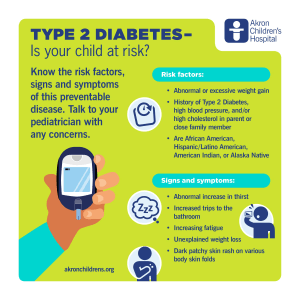Center for Diabetes and Endocrinology

Akron Children's was ranked #46 in the U.S. News and World Report 2023-2024 Best Hospitals for Pediatric Diabetes and Endocrinology. Click here to view the U.S. News scorecard, which recognizes our excellence in management of diabetes and hypothyroid, infection prevention, commitment to best practices, clinical research and adequacy of nurse staffing.
Akron Children's Endocrinology was ranked #38 in the Newsweek and Statista America's Best Children's Hospitals 2024 - Newsweek Rankings.
When it comes to diagnosing, treating and managing diabetes and endocrine disorders, we have specialized knowledge and experience with kids and teens. If your child has problems with growth, puberty, diabetes or other disorders related to the hormones or the endocrine glands that produce them, we are here to help. We also offer multidisciplinary care of children with thyroid nodules and cancer, and specialized care of children with cystic fibrosis and Turner syndrome.
Department: 330-543-2778
About Endocrinology
Other conditions we treat include:
- Adrenal disorders
- Ambiguous genitalia
- Cushing's syndrome
- Low blood sugar (hypoglycemia)
- Metabolism disorders
- Obesity caused by an endocrine imbalance
- Ovarian and testicular dysfunction
- Pituitary disorders
- Thyroid disease
Endocrinology, Akron
Akron Children's Center for Diabetes and Endocrinology, AkronConsidine Professional Building
215 West Bowery Street
Level 6
Akron, Ohio 44308
Map & directions
More about this location...
Hours
Appointments: 330-543-2778
Department: 330-543-3276
Endocrinology, Boardman
Akron Children's Pediatric Endocrinology, BoardmanLeonard J. Fisher Family Building
6505 Market Street, Building A
Boardman, Ohio 44512
Fax: 330-543-8489
Map & directions
More about this location...
Hours
Appointments: 330-543-2778
Department: 330-543-3276
Endocrinology, Boston Heights
Akron Children's Endocrinology, Boston HeightsAkron Children's Health Center, Boston Heights
328 East Hines Hill Road
First floor - 1200e
Boston Heights, Ohio 44236
Map & directions
More about this location...
Hours
Appointments: 330-543-2778
Department: 330-543-3276
Endocrinology, Mansfield
Akron Children's Pediatric Endocrinology, MansfieldAkron Children's Health Center, Mansfield
1029 South Trimble Road
Mansfield, Ohio 44906
Map & directions
More about this location...
Hours
Appointments: 330-543-2778
Endocrinology, Medina
Akron Children's Pediatric Endocrinology, MedinaAkron Children's Health Center, Medina
3778 Medina Road
Medina, Ohio 44256
Map & directions
More about this location...
Hours
Appointments: 330-543-2778
Department: 330-543-3276
Endocrinology, North Canton
Akron Children's Pediatric Endocrinology, North Canton6076 Whipple Avenue Northwest
North Canton, Ohio 44720
Map & directions
More about this location...
Hours
Appointments: 330-543-2778
Department: 330-543-3276
ENT, Warren
Akron Children's Pediatric Otolaryngology, WarrenAkron Children's Health Center, Warren
5000 East Market Street
Warren, Ohio 44484
Map & directions
More about this location...
Hours
Tuesday : 8 a.m. - 5 p.m.
Appointments: 330-543-4930
Naveen Uli, MD
Medical Director, Center for Diabetes and Endocrinology; Pediatric Endocrinologist
Ryan Heksch, MD
Pediatric Endocrinologist; Associate Pediatric Residency Program Director; M & M Conference and Residency Teaching Elective
Rathna Mandalapu, MD
Pediatric Endocrinologist; Providing gender-affirming medicine care for patients 19 and older
Lisa Davis, MSN, APRN-CNP
Co-Director, Turner Syndrome Center; Pediatric Nurse Practitioner
Open Clinical Studies
TrialNet Pathway to Prevention of T1D
This study involves testing a small sample of blood from relatives of people with type 1 diabetes to see who may be at risk for developing diabetes. If the test is positive, additional testing will be offered to evaluate the likelihood of developing diabetes later in life.
Full study details: https://clinicaltrials.gov/ct2/show/NCT00097292?term=TrialNet&rank=1
More about this studyA study evaluating the safety and efficacy of Debio 4326 in treating precocious puberty in children receiving gonadotropin-releasing hormone agonist
Please view the study at Clinicaltrials.gov for complete information.
More about this studyAkron Children’s Hospital Diabetes Camp will be held at Camp Asbury in Hiram, Ohio, the week of June 16-20, 2025.
Pre-diabetes in children has doubled in the last 20 years. To learn what parents can do to reduce the risk of their child developing prediabetes, Dr. Naveen Uli, the medical director of the Center for Diabetes and Endocrinology at Akron Children’s, answers some questions about this alarming trend.
Why are cases increasing?
The primary driver is the increase in overweight and obese kids. Weight gain has gone up significantly over the last two decades in children.
What happens once a child develops diabetes?
Once a child develops full-blown diabetes, that triggers a cascade of other organ involvement and other medical conditions, and that raises the risk for heart disease, high cholesterol, fatty liver disease, and sleep apnea. So that’s really a cascade of health problems that are then lifelong.
What leads to the development of pre-diabetes?
Diet and inactivity are some primary causes. We have seen an increase in the total amount of calories consumed and the amount of empty calories consumed. And along with that, there is also the decrease in physical activity and increase in sedentary behaviors, like increased screen time. And so they’re consuming more calories than before on a daily basis, at the same time, their bodies are burning fewer calories and the net effect is that there is increased storage of calories and fat, which leads to weight gain. This puts a lot of stress on their pancreas, which is the source of insulin and is key to maintaining normal blood sugars. And the end result is that blood sugar starts going up.
Do kids’ and teens’ schedules play a role in the development of prediabetes?
It certainly matters. When there is breakdown in the schedule, there is eating on the go and more reliance on prepared, highly processed foods. Highly processed foods have less nutrients and are loaded with empty calories like sugars, fat and salt. Kids are also putting a lot of activities on their plates, and so sleep is decreasing. The effect is an increase in weight, and then that leads to the increase in their risk for prediabetes and diabetes.
How does screen time play a role in the development of prediabetes in kids?
A lot of education happens on the screen these days, and COVID has certainly affected this. Screen time has really gone through the roof as a result. And this was happening even before the pandemic, but the pandemic just made it worse. I think we have yet to see the effect of the pandemic in terms of the increase in obesity in children and what effect that has on their risk for diabetes, heart disease, high cholesterol, and all those health consequences of increased weight gain.
What are some ways parents can prevent prediabetes in their kids?
Starting very early is really important. So whenever you take your child for a well visit, pay attention to the weight trends of your child. And also have the pediatrician plot the body mass index, which is a calculation of how the weight compares to the height. If that shows a rising trend very early on, that’s a clue that you should pay attention there and nip it in the bud very early. Because once the pounds are on the child, it is difficult to reverse that.
And of course, pay attention to your child’s schedule and eating habits. If you can, try to cook fresh vegetables, fruits, less processed foods, cut down on sugar-added drinks, the juices and sodas. Make sure your child gets at least 60 minutes of physical activity per day. And then the screen time recommendation is to keep time under two hours.
Do you have questions about prediabetes, diabetes or your child’s health? Schedule an appointment with a pediatrician.
Risk factors:
- Family history of Type 1 diabetes
- Age: Most frequently diagnosed in children and teens
Talk to your pediatrician about any concerns.
Patient Resources
Fact sheets (for schools)
The Diabetes Community Education Team at Akron Children's Center for Diabetes and Endocrinology provides fundamental training on diabetes management to school and childcare staff, enabling them to effectively care for children living with diabetes.
Professional Development Days
These sessions provide general education on diabetes management for staff members in school or childcare settings. Training is applicable for
- Nurses
- Teachers
- Health aids
- Coaches
- Bus drivers
- Staff
Designated Care Giver Training
This hands-on training is designed specifically for the people who will be providing direct diabetes care to an individual student regarding various aspects of diabetes management, including:
- Insulin administration.
- Glucose monitoring and management.
- Diabetes emergencies.
- Review of Diabetes Medical Management Plan.
Diabetes Education Team
The multidisciplinary team consists of a nurse practitioner, registered nurse, dietician and social worker.
Diabetes Community Education Team members:
- Lead APP: Amy Albrecht, MSN, APRN, CPNP, CDE
- Lead RN: Kristyn Bruno, MSN, RN, CDCES
- Dietician: Danielle Dimengo, MS, RD, LD, CDCES
- Social Worker: Angie Troyer, LISW-S
- Clinical Secretary: Sandra Easterling
To schedule training or for more information
Call 330-543-3276, option 3 or email endocrine@akronchildrens.org
Programs and Clinics
- Specialty Programs:
- Turner Syndrome Center
- Thyroid Program
Conditions and Treatments:
adrenal disorders, ambiguous genitalia, calcium and bone disorders, childhood obesity, congenital adrenal hyperplasia, cushing's syndrome, delayed puberty, diabetes, disorders of mineral metabolism, disorders of sexual development, growth disorders, hyperglycemia, hypoglycemia, marfan syndrome, metabolic bone disease, PKU, pancreatitis, parathyroid disorders, pheochromocytoma, precocious puberty, premature thelarche, short stature, thyroid disease, turner syndrome
















































